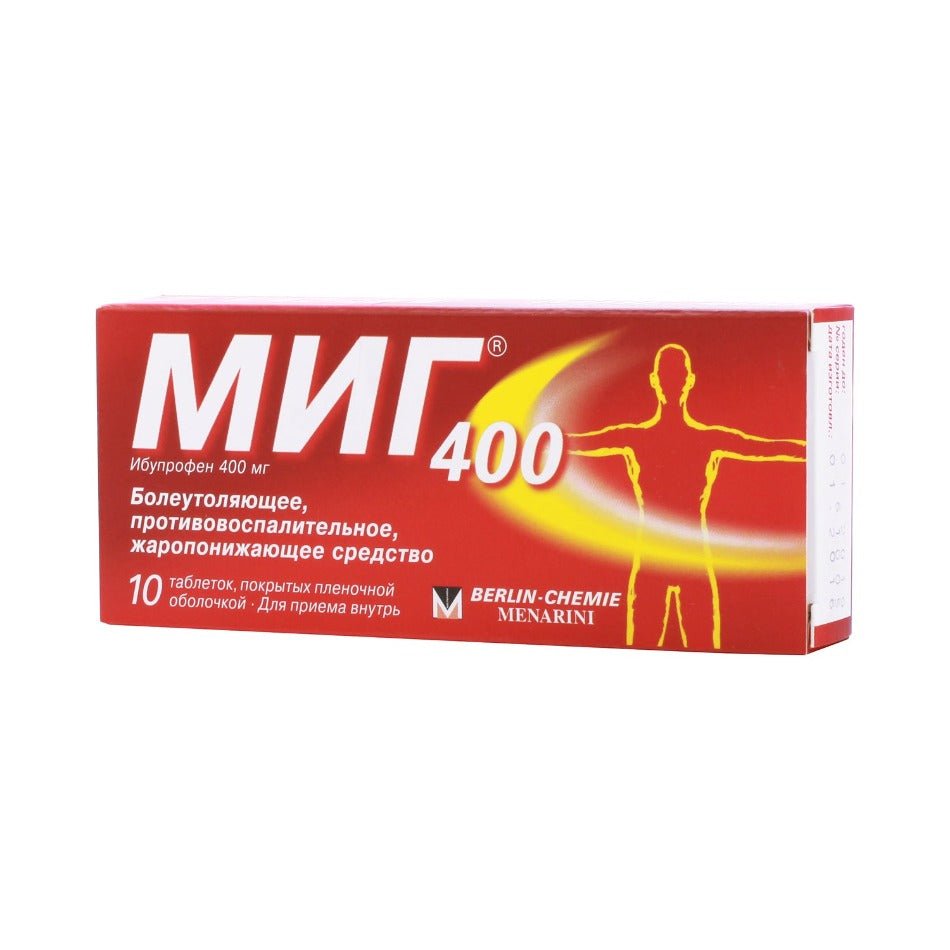Please double-check your email address when placing an order. A correct email ensures you receive shipping updates and don’t miss your package.
If you don’t see our emails, check your Spam folder.
MIG 400 10 tabs
⛟ Same day shipping
❤ Free US shipping on Orders $59+
☎ Can’t find it? Ask us via WhatsApp, phone or chat
💰Bonus program
MIG 10 tabs
If this product is temporarily out of stock, consider: Solpadeine Active 65 mg + 500 mg 12 tabs
Description
Film-coated tablets of white or almost white color, oval, with a double-sided score line for splitting and embossing "E" and "E" on both sides of the score on one side.
1 tab.
Ibuprofen 400 mg
Excipients: corn starch 215 mg, sodium starch glycolate (type A) 26 mg, colloidal silicon dioxide 13 mg, magnesium stearate 5.6 mg.
Coating composition: hypromellose (viscosity 6 mPa×s) 2.946 mg, titanium dioxide (E171) 1.918 mg, povidone K30 0.518 mg, macrogol 4000 0.56 mg.
Indications
Headache; migraine; toothache; neuralgia; muscle and joint pain; menstrual pain; febrile conditions in colds and flu.
Contraindications
Erosive and ulcerative diseases of the gastrointestinal tract (including peptic ulcer disease of the stomach and duodenum in the acute stage, Crohn's disease, ulcerative colitis); "aspirin triad"; hemophilia and other coagulation disorders (including hypocoagulation), hemorrhagic diathesis; bleeding of various etiologies; glucose-6-phosphate dehydrogenase deficiency; optic nerve disorders; pregnancy; lactation period; children under 12 years of age; hypersensitivity to the components of the drug; hypersensitivity to acetylsalicylic acid or other NSAIDs in medical history.
Use with caution in elderly patients, in cases of heart failure, arterial hypertension, liver cirrhosis with portal hypertension, hepatic and/or renal failure, nephrotic syndrome, hyperbilirubinemia, peptic ulcer of the stomach and duodenum (in history), gastritis, enteritis, colitis, blood disorders of unknown origin (leukopenia and anemia).
*We apologize for any inconvenience in case of the product being out of stock.
Please feel free to use this form to contact us, and we will notify you as soon as the item is available again.
Here's something that might pique your interest:
Healthy Habits for Heart Health: Beyond OTC products
In our blog, you can discover a wealth of fascinating and valuable information.
Thank you for choosing USA Apteka, your Russian pharmacy and trusted source for popular, favorite OTC products from Russia, Ukraine, and other CIS countries.
Important
Use
Warnings
Please Chat with us or send us a message on WhatsApp








